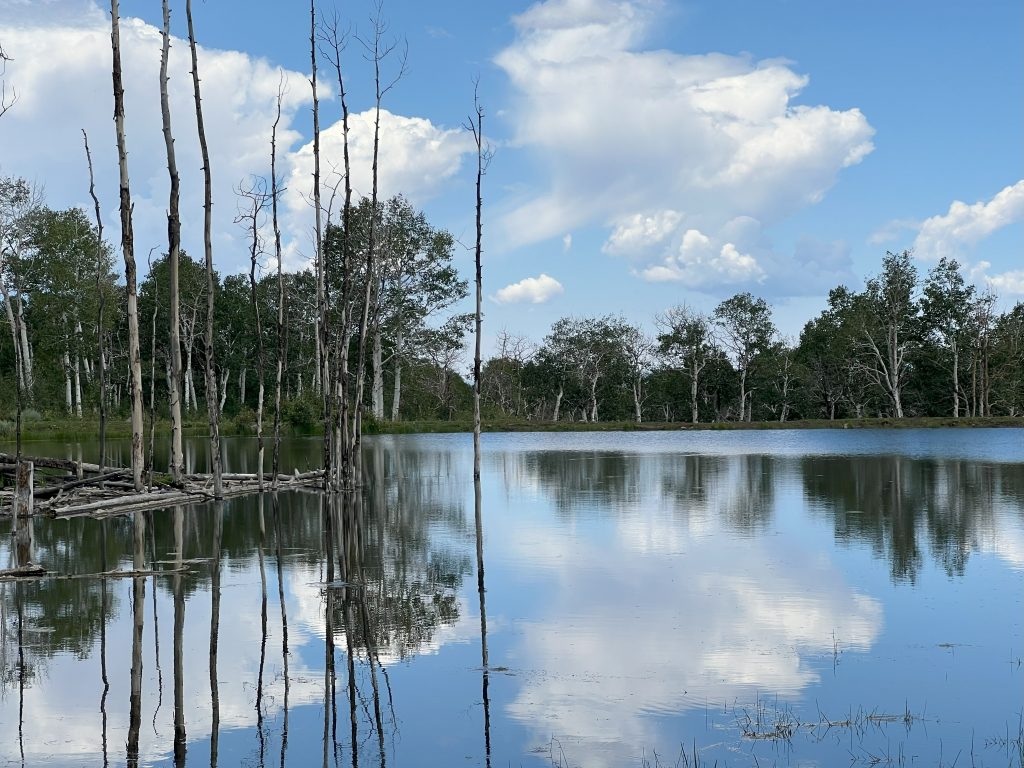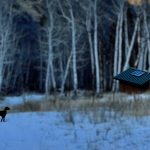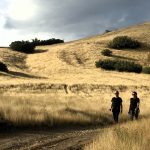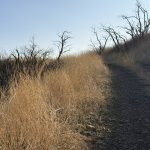
One afternoon not long ago, I stood beside a pond. The light was soft, and the water mostly still—except for two ducks gliding toward each other. Unaware of the another, they just followed their own meandering paths until something changed. One veered slightly—maybe too close, maybe too fast. The other reacted. A flash of wings, a jolt forward. A sudden burst of splashing. One snapped. The other snapped back. For a few seconds, it was chaos—water slapping against feathers, bills jabbing, bodies lunging.
Then it stopped. Just as suddenly as it had begun, the moment passed. Each duck turned and paddled away. But not before both of them flapped—hard. Wide, powerful sweeps of their wings, throwing water in every direction.
Then: stillness.
No looking back.
No grudge.
Just movement.
I’ve seen ducks do this before, but I never really noticed until I read Eckhart Tolle’s take. In The Power of Now, he tells the same story. “If the duck had a human mind,” he writes, “it would keep the fight alive by thinking, by story-making.” One duck would drift off grumbling, That jerk always does this. He’s a threat. He meant to disrespect me. The other would stew: He’s not going to get away with that. Next time, I’ll show him who’s in charge. But ducks don’t stew. They shake. They flap. They swim on.
And here’s the thing—we don’t know what actually happened. Did one duck get too close on purpose? Was it a dominance move? Or just a misstep, a bad angle in tight quarters? In the moment, it looked aggressive. But does it really matter?
Because we do the same thing—only with a twist: we make meaning out of moments that may not have meant anything at all. We assume intent. We assign blame. We create a story and then carry that story for days, weeks, even years. Unlike the ducks, we don’t flap the energy away—we carry it. We cradle it like something precious.
That’s why in recovery circles, you sometimes hear this phrase: “Resentment is like drinking poison and waiting for the other person to die.”
We hold on to offense thinking it protects us—keeps us alert, keeps us strong. But it corrodes from the inside. Most of the time, the person who wronged us (or who we think wronged us) has moved on, unaware or unconcerned. We’re the ones reliving it. We’re the ones rehearsing the monologue. Nursing the bitterness. Tightening the grip.
I think about that a lot. Because I don’t always let things go. I want to. But some days it feels easier to collect small offenses than to release them. I mistake tone for intent. I assume harm where there was likely none. I walk away not flapping, but holding—tight.
And that holding has consequences.
We cling to misunderstandings. We build entire frameworks of judgment based on a single comment, a single vote, a single look. We categorize people—ally or enemy—on astonishingly little data. And once the label sticks, we rarely revisit it.
Terry Warner observed this pattern and gave it a name: self-betrayal. It begins, he said, when we act contrary to what we know is right. And instead of correcting course, we justify. We build a story in which they are to blame—and we’re innocent. It feels protective, but it keeps us stuck. “When I betray myself,” Warner wrote, “I begin to see the world in a way that justifies my self-betrayal.” What could have been a moment of clarity becomes a cycle of self-deception.
And the worst part? We begin to see ourselves as righteous, and others as threats.
Proverbs offers a blunt but brilliant counter to this: “The discretion of a man deferreth his anger; and it is his glory to pass over a transgression.” (Proverbs 19:11) Not to deny it. Not to pretend it never happened. But to overlook it—to rise above it. That’s the difference. There’s wisdom in restraint. There’s glory in refusing to take the bait.
What’s strange is that we’re capable of incredible discernment. No other creature in the animal kingdom has our capacity for abstraction, for critical thought, for layered understanding. And yet, we often choose the shortcut of agreement. We believe something because someone with a microphone said it—or because someone we like repeated it. We agree to go along because it’s easier than standing out. We want to belong. We want to be safe. But sometimes in that belonging, we outsource our thinking.
In nature, this doesn’t happen. Trees don’t take offense when the wind leans them sideways. Elk don’t gossip about who got to the watering hole first. The natural world pulses with tension, yes—competition, even violence—but it’s rarely personal. Even predators don’t bear malice. They hunt. They eat. They rest. What they don’t do is stew.
When nature deals with conflict, it does so cleanly. Precisely. It moves through it. What it doesn’t do is carry the energy forward into the next interaction, the next season, the next generation.
We do.
And yet, we don’t have to.
This isn’t a call to suppress real wounds or to become passive in the face of injustice. There are injuries worth naming. Words that do real damage. Structures that need reform. But far more often, we suffer not from deep wounds, but from paper cuts—slights that grow sharp only because we revisit them so often.
And when we do, we forget the power of forbearance. Not forgiveness as some grand heroic act—but the quiet, daily discipline of not taking offense. The willingness to assume good intent. To ask questions. To pause before reacting. To not rush in with judgment simply because it feels righteous or satisfying.
Because when I pause—when I resist the urge to defend or rehearse my story—something else becomes possible. I get past my ego. Past my certainty. Past my hunger to be right. And getting past myself is where I find God.
It’s in that space—just past the offense, just beyond the story—that a new kind of clarity shows up. A stillness not of resignation, but of grace.
We could flap.
We could breathe.
We could leave more energy in the water.
The ducks aren’t sages. But in one sense, they’re far wiser than we are. They don’t build narratives around every ripple. They don’t let a brief encounter define the day. They just shake it off—and swim on.
Maybe we can’t live like ducks. But we could learn from them.
Especially when the pond is crowded—and we’re the ones making waves.






Well said… thanks for the insightful narrative. I’m trying to do this more each day!
Thanks, David!